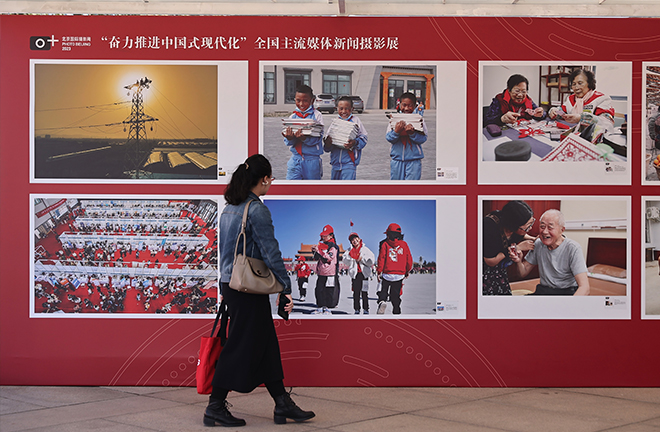China’s success owed to its own path

A woman attends a photo exhibition on Chinese modernization in Beijing. Photo: CNSphoto
The success of China’s development and its continued economic growth have been subjects of significant interest among foreign scholars. Recently, Loretta Napoleoni, an Italian economist, China expert, and author of the best-selling book Rogue Economics, shared with CSST her insights into the achievements of Chinese modernization, as well as the challenges and opportunities facing China’s economy.
In her view, the socialist market economy system with Chinese characteristics has played a crucial role in facilitating Chinese modernization. Furthermore, she believes that the Chinese leadership possesses the capability to effectively guide the nation’s further development.
Fruitful Chinese model
Napoleoni commented that China’s sheer size sets it apart from other nations, suggesting it should be viewed more akin to a continent than a single country. Chinese modernization progressed very rapidly in comparison to Western modernization, partly because it commenced relatively late, allowing it to bypass certain phases of industrialization and modernization, and partly due to the Chinese economic model.
According to Napoleoni, the market mechanism and competition in the Chinese economic model have worked very well.
Napoleoni continued to elaborate on the CPC’s role in Chinese modernization. “Let’s not forget the century of shame and humiliation. The colonization of part of China has inflicted a deep wound on the nation and at the same time it has shown that the policy of isolation pursued by China was not any longer suited,” Napoleoni said. “The CPC has embarked to transform China into a modern nation in a modern world. This task is massive and requires compromises, often difficult to perform.”
The CPC was able to guide the modernization process, steering it towards its goals, which are the improvement of the people’s lives. While the price paid was high, it was not as high as the price paid by Western countries, she said.
Uniqueness of China
Napoleoni emphasized that President Xi Jinping’s policies are aligned with the original mandate of the CPC, which is modernizing China while maintaining its socialist soul.
“Western analysts and leaders do not understand China, they look at it as any other nation—well China is not. It is unique for many reasons,” Napoleoni noted.
First, it has been a nation for over 5,000 years, she said. Another fundamental difference between China and the rest of the world is size, and size does matter. Running a huge country, both territorially and in terms of population, requires discipline, compromise, and sacrifice—very different from running a small nation.
Finally, China has been modernizing since the late 1970s. In this short span of time, it has undergone the necessary stages of modernization, and has done so in a time in which communication is instant and politics is under the magnifying glass of traditional and social media, Napoleoni added.
“Western analysts have applied to China the rules of understanding of the present day, forgetting that China is still catching up with the modernization of the West,” Napoleoni said. This time lag may explain why China’s policy is often misunderstood.
“I am still a firm believer in the Chinese model—socialism with Chinese characteristics for a new era, and I am still trusting Xi as the leader that can deliver it,” Napoleoni stated.
Napoleoni said the Chinese leadership is actively working to preserve China’s uniqueness, which could be lost by embracing a purely capitalist model. “Luckily, China is successful in this endeavor. Capitalism does not work anymore in the West, as demonstrated by the great inequalities and by the wars in which the West is involved. It has reached its limit, so reproducing it in China would be a mistake.”
Chinese economy not collapsing
During the interview, Napoleoni dismissed the notion propagated by some Western media outlets that the Chinese economy is on the brink of collapse. “I do not think the Chinese economy is about to collapse,” Napoleoni asserted.
China is now a mature economy. It is inevitable that at this stage the economic model will require modification, she continued. “Qualitative production is what mature economies produce. If you look at the economic reconstruction of Western Europe after WWII, for example, you find a similar pattern. But China is already moving in this direction. Look at electric cars, for example, China is a leading producer.”
As for corruption, Napoleoni argues that it is pervasive in any economy. “People are people. What matters is how the leadership of a nation navigates the hard times, curbs corruption, and avoids it tainting the key powers.”
“If you look at Western countries you could see how since World War II, which was the catastrophic event that wiped away the corrupted elements of Western politics, the establishment has progressively become more and more corrupted. This phenomenon has eroded democracies and weakened the support of the people,” Napoleoni said.
Edited by CHEN MIRONG
